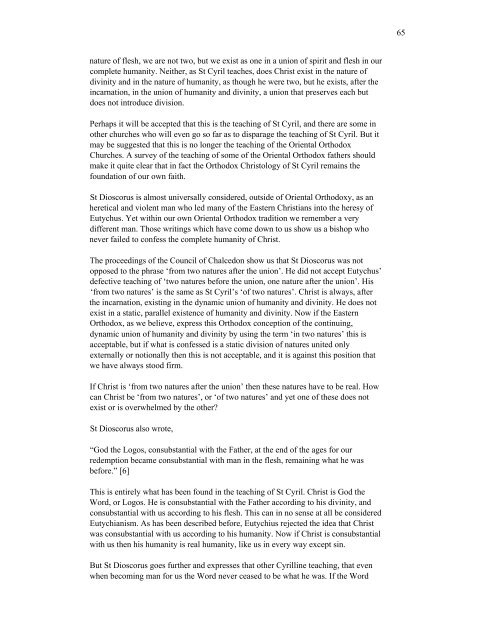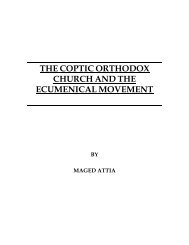Coptic interpretations of the Fourth Ecumenical Council - Saint Mina ...
Coptic interpretations of the Fourth Ecumenical Council - Saint Mina ...
Coptic interpretations of the Fourth Ecumenical Council - Saint Mina ...
Create successful ePaper yourself
Turn your PDF publications into a flip-book with our unique Google optimized e-Paper software.
nature <strong>of</strong> flesh, we are not two, but we exist as one in a union <strong>of</strong> spirit and flesh in our<br />
complete humanity. Nei<strong>the</strong>r, as St Cyril teaches, does Christ exist in <strong>the</strong> nature <strong>of</strong><br />
divinity and in <strong>the</strong> nature <strong>of</strong> humanity, as though he were two, but he exists, after <strong>the</strong><br />
incarnation, in <strong>the</strong> union <strong>of</strong> humanity and divinity, a union that preserves each but<br />
does not introduce division.<br />
Perhaps it will be accepted that this is <strong>the</strong> teaching <strong>of</strong> St Cyril, and <strong>the</strong>re are some in<br />
o<strong>the</strong>r churches who will even go so far as to disparage <strong>the</strong> teaching <strong>of</strong> St Cyril. But it<br />
may be suggested that this is no longer <strong>the</strong> teaching <strong>of</strong> <strong>the</strong> Oriental Orthodox<br />
Churches. A survey <strong>of</strong> <strong>the</strong> teaching <strong>of</strong> some <strong>of</strong> <strong>the</strong> Oriental Orthodox fa<strong>the</strong>rs should<br />
make it quite clear that in fact <strong>the</strong> Orthodox Christology <strong>of</strong> St Cyril remains <strong>the</strong><br />
foundation <strong>of</strong> our own faith.<br />
St Dioscorus is almost universally considered, outside <strong>of</strong> Oriental Orthodoxy, as an<br />
heretical and violent man who led many <strong>of</strong> <strong>the</strong> Eastern Christians into <strong>the</strong> heresy <strong>of</strong><br />
Eutychus. Yet within our own Oriental Orthodox tradition we remember a very<br />
different man. Those writings which have come down to us show us a bishop who<br />
never failed to confess <strong>the</strong> complete humanity <strong>of</strong> Christ.<br />
The proceedings <strong>of</strong> <strong>the</strong> <strong>Council</strong> <strong>of</strong> Chalcedon show us that St Dioscorus was not<br />
opposed to <strong>the</strong> phrase ‘from two natures after <strong>the</strong> union’. He did not accept Eutychus’<br />
defective teaching <strong>of</strong> ‘two natures before <strong>the</strong> union, one nature after <strong>the</strong> union’. His<br />
‘from two natures’ is <strong>the</strong> same as St Cyril’s ‘<strong>of</strong> two natures’. Christ is always, after<br />
<strong>the</strong> incarnation, existing in <strong>the</strong> dynamic union <strong>of</strong> humanity and divinity. He does not<br />
exist in a static, parallel existence <strong>of</strong> humanity and divinity. Now if <strong>the</strong> Eastern<br />
Orthodox, as we believe, express this Orthodox conception <strong>of</strong> <strong>the</strong> continuing,<br />
dynamic union <strong>of</strong> humanity and divinity by using <strong>the</strong> term ‘in two natures’ this is<br />
acceptable, but if what is confessed is a static division <strong>of</strong> natures united only<br />
externally or notionally <strong>the</strong>n this is not acceptable, and it is against this position that<br />
we have always stood firm.<br />
If Christ is ‘from two natures after <strong>the</strong> union’ <strong>the</strong>n <strong>the</strong>se natures have to be real. How<br />
can Christ be ‘from two natures’, or ‘<strong>of</strong> two natures’ and yet one <strong>of</strong> <strong>the</strong>se does not<br />
exist or is overwhelmed by <strong>the</strong> o<strong>the</strong>r?<br />
St Dioscorus also wrote,<br />
“God <strong>the</strong> Logos, consubstantial with <strong>the</strong> Fa<strong>the</strong>r, at <strong>the</strong> end <strong>of</strong> <strong>the</strong> ages for our<br />
redemption became consubstantial with man in <strong>the</strong> flesh, remaining what he was<br />
before.” [6]<br />
This is entirely what has been found in <strong>the</strong> teaching <strong>of</strong> St Cyril. Christ is God <strong>the</strong><br />
Word, or Logos. He is consubstantial with <strong>the</strong> Fa<strong>the</strong>r according to his divinity, and<br />
consubstantial with us according to his flesh. This can in no sense at all be considered<br />
Eutychianism. As has been described before, Eutychius rejected <strong>the</strong> idea that Christ<br />
was consubstantial with us according to his humanity. Now if Christ is consubstantial<br />
with us <strong>the</strong>n his humanity is real humanity, like us in every way except sin.<br />
But St Dioscorus goes fur<strong>the</strong>r and expresses that o<strong>the</strong>r Cyrilline teaching, that even<br />
when becoming man for us <strong>the</strong> Word never ceased to be what he was. If <strong>the</strong> Word<br />
65








